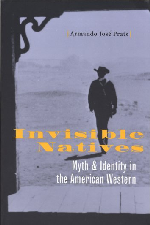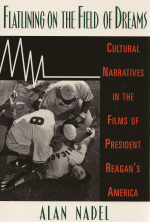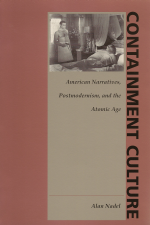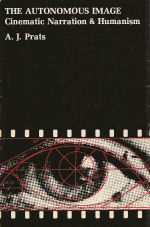Film History and Criticism
 Invisible Natives: Myth & Identity in the American Western Invisible Natives: Myth & Identity in the American Western
Cornell University Press, 2002
Armando Jose Prats
This book casts a critical eye on the representation of Native Americans in the Western film since the genre's beginnings. Armando Jose Prats shows the ways in which film reflects cultural transformations in the course of America's historical encounter with "the Indian." He also explores the relation between the myth of conquest and American history. Among the films he discusses at length are Northwest Passage, Stagecoach, The Searchers, Hombre, Hondo, Ulzana's Raid, The Last of the Mohicans, and Dances with Wolves.
|
 Flatlining on the Field of Dreams: Cultural Narratives in the Films of President Reagan’s America Flatlining on the Field of Dreams: Cultural Narratives in the Films of President Reagan’s America
Rutgers University Press, 1997
Alan Nadel
Flatlining on the Field of Dreams demonstrates, with witty prose and careful analysis, how the overindulgent, image-conscious years of the Reagan administration are reflected in sundry aspects of American films produced during that era. Discussing dozens of films, Alan Nadel identifies narratives about credit, deregulation, gender, race, and masculinity that defined “President Reagan’s America.” The book provides hard-to-ignore demonstrations of the extensive synergy between politics, history, and pop culture.
|
 Containment Culture: American Narratives, Postmodernism, and the Atomic Age Containment Culture: American Narratives, Postmodernism, and the Atomic Age
Duke University Press, 1995
Alan Nadel
Examining a broad sweep of American culture, from the works of George Kennan to Playboy Magazine, from the movies of Doris day and Walt Disney to those of Cecil B. deMille and Alfred Hitchcock, Nadel discloses the remarkable persuasiveness of the containment narrative. Drawing on insights provided by contemporary theorists he situates the rhetoric of the cold war within a gendered narrative powered by the unspoken potency of the atom. He then traces the breakdown of this discourse of containment and ties its collapse to the onset of American postmodernism.
|
 The Autonomous Image: Cinematic Narration & Humanism The Autonomous Image: Cinematic Narration & Humanism
The University of Kentucky Press, 1981
Armando Jose Prats
Prats’s essay on the new humanism inherent in postwar film-making is a rewarding work with implications for the fields of esthetics and axiology as well as film criticism. In his analyses of four films by three directors, Prats shows the contrasts between the conventional, word-bound narrative methods of the past and the new narrative in which images are fee to display their energies fully. The autonomous visual event, Prats finds, offers one of the most direct ways of entering into adventure of ideas, particularly in the realm of human values.
|